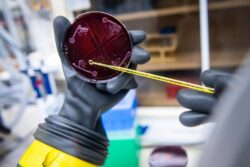Feces from a healthy donor, which is then formulated into either capsules or enemas (Picture: L.A. Cicero)
The first ‘poo transplant’ has been officially approved in Australia, to target serious bacterial infection.
It’s the first time the procedure has been given regulatory approval anywhere in the world.
A ‘poo transplant’ or faecal microbiota transplant (FMT) invloves transplanting gut bacteria from a healthy person’s stools to help restore healthy gut bacteria.
Feces from a healthy donor is formulated into either capsules or enemas that can be given through a pill that you swallow or through a tube inserted directly through the nose. Or you could have it inserted through a tube up your colon.
The goal is to populate the patient’s gut microbiome with healthy beneficial bacteria.
In the US, the Food and Drug Administration (FDA) informally allows clinical uses of fecal transplants (Picture: AP Photo/Jacquelyn Martin)
In August, the UK’s The National Institute for Health and Care Excellence (NICE) started offering the treatement to hundreds of superbug victims.
Since FMT can be considerably cheaper than antibiotics if given as an oral capsule, it could save more than £8,000 for the NHS. It can also save hundreds of pounds if given as a colonoscopy but is more expensive when given as an enema.
Nice had estimated that 450 to 500 people in England could be treated using FMT for multiple recurrences of C.diff infections each year.
Australia’s regulator has given approval to a biotechnology company BiomeBank for its ‘microbiome-based therapy product’ dubbed BIOMICTRA.
Similar to the UK, the therapy is specifically approved only to treat infections from Clostridioides difficile bacteria, commonly referred to as C. diff.
Australia’s regulator has given approval to a biotechnology company BiomeBank for its ‘microbiome-based therapy product’ dubbed BIOMICTRA (Picture: Unsplash)
BiomeBank has reportedly cultivated a collection of ‘super donors’, young and healthy people who regularly attend the company’s facility to deliver fecal samples in custom-designed toilets.
The samples are then processed into syringes, frozen, and delivered to clinical facilities for administration via either colonoscopy or enema.
BiomeBank is already looking to a future of fecal transplants beyond having human donors supplying poo samples. The company is building a collection of bacterial strains in the hopes of creating cultured and standardized microbiome-transplants.
A recent study at Stanford University demonstrated the first successful fecal transplant in mice using a microbiome built from 104 different bacterial species chosen to resemble an optimal healthy gut bacteria population.
MORE : Woman builds AI system to monitor her cats’ poop
MORE : Kim Kardashian would ‘eat poop’ to look younger – why are women always on a quest to look ageless?
It involves transplanting gut bacteria from a healthy person’s stools.





